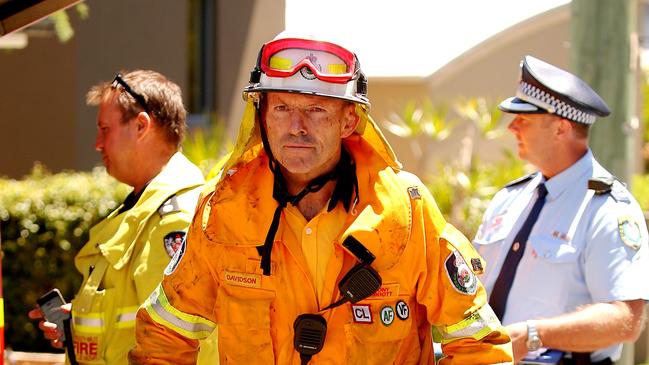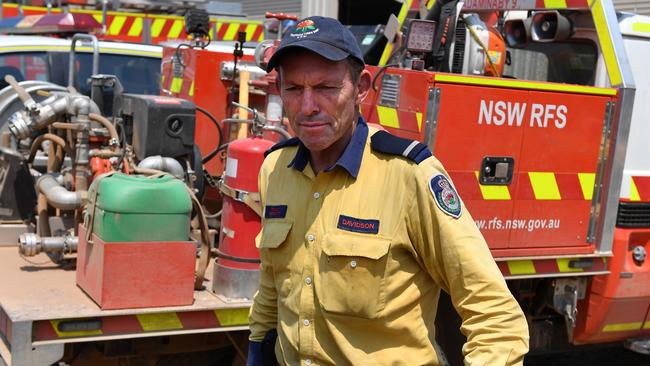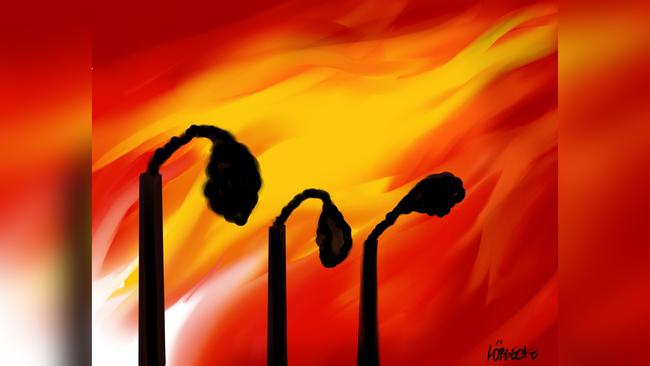
The bushfires — which had been raging for more than four months and had devastated big chunks of our eastern states — hadn’t just mesmerised Australians. They’d begun to fascinate much of the world through footage of kangaroos fleeing past blazing buildings.
Was this just another instance of the perils of living in a “wide brown land” or did it presage the future for many countries in the era of global warming?
To former NSW Fire and Rescue commissioner Greg Mullins, more fires are our fate if mankind (and especially Australia) doesn’t act faster to reduce carbon dioxide emissions.
Like me, Greg is a volunteer with the NSW Rural Fire Service. I’ve served on the fireground with him, and he’s an exemplary firefighter and inspires great confidence as a leader. But while these fires are probably the worst ever experienced in some parts of the country, in my judgment it’s a mistake to attribute them mainly to climate change.
So far, about eight million hectares with 2000 homes have been destroyed in these fires and 26 people have died. But five million hectares were burnt out in just a few days in the Black Thursday bushfires in Victoria way back in 1851. More than 100 million hectares were burnt out in the 1974 fire season. And 2000 homes were lost and 173 people died in the Black Saturday bushfire horror of 2009. Australia has always been a land of “drought and flooding rain” and doubtless will remain so regardless of the extent to which human intervention might be changing the climate.
Unusually for an Australian natural disaster, the focus hasn’t been mainly on the efforts of emergency personnel and the government’s work to prevent, to mitigate or to recover from these tragedies.
From the start, the role of climate change has been front and centre of public discussion, even though shortly before these fires really got going one of Australia’s leading climate scientists, Andy Pitman, said that it was impossible to attribute the present drought largely to climate change and that the incidence of drought hadn’t increased over the past century.
Australia is on track to meet its Paris emissions reduction targets, unlike many of the countries that most righteously proclaim that climate change is the biggest issue facing the planet. Despite this, Scott Morrison was actually snubbed by some bushfire victims, although it was lightning strikes and arson — not climate change — that had ignited many of these fires.
Meanwhile, far from media conferences and opinion page contention, tens of thousands of largely volunteer firefighters have been doing what they can to protect communities. I had always said to my brigade that when I ceased being a full-time politician I’d be a full-time fireman, little realising how much firefighting there’d be this summer.

Since early September, volunteers have put their lives on hold to fight fires. Three five-day deployments to fires in the north of NSW and, more recently, three five-day deployments to the south plus, in between, nine single-day deployments for fires around Sydney that I’ve been on would be typical for many of the Rural Fire Service’s 50,000-plus volunteers.
Employers have made sacrifices to release staff and self-employed people have forgone their income to serve the community in a time of trouble. As well as the firefighters, there has been a small army of volunteers from community organisations providing meals; with vast numbers of police, road gangs and power workers to keep fire-affected roads closed and to clear fallen trees and to get the power back on after firefronts have passed. More recently, thanks to the Prime Minister, there has been an unprecedented deployment of the army to help with a domestic disaster. Soon there will be rebuilding on a massive scale in the small towns that have suffered most.
For all the firefighters, there are moments of apprehension when confronting 15m-high walls of flame. But there’s also deep satisfaction at being able to help in a desperate situation when lives and property are under severe threat. And it’s not just people. On the north coast, for instance, my crew was able to keep fire from a tree where a koala was sheltering.
A while back, when crews from the northern beaches of Sydney had stopped to refill our trucks in the small south coast town of Milton, the publican invited us in for coffee and something to eat. On our way out all the patrons stood to applaud.
To me, that’s the spirit of Australia: people doing what they can to help, whether it’s doing the actual job, helping others to do the job or just encouraging everyone else as they get on with it. Sure, we have our arguments over politics, but overcoming the immediate threat always comes first.
Tony Abbott was Australia’s 28th prime minister and has served in the Davidson Rural Fire Brigade where he is a deputy captain since 2000.





Reporters from France and Norway — as well as numerous local ones — were present in the small Australian hamlet of Adaminaby when my fire crew pulled in the other day.